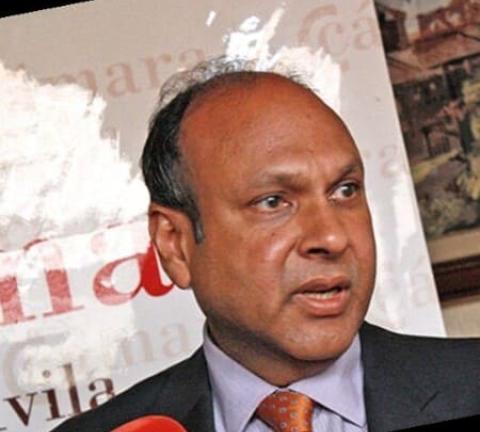
Master in Supply Chain Management & Logistics
Domina la gestión de cadena de suministro y logística con nuestro Master in Supply Chain. Fórmate en Lean Six Sigma Yellow Belt para aplicar los principales básicos de Lean Six Sigma en tu organización.
*El Máster Universitario en Dirección y Cadena de Suministro es un título en proceso de evaluación por la Fundación Madri+d y de verificación final por el Consejo de Universidades.
- Young Professional
- Full Time
- 60 ECTS
- OCT. 2025 - 10 meses
- Inglés
Sobre Master in Supply Chain Management and Logistics
Este máster se imparte en INGLÉS.
El flujo de información y de material que se produce desde el proveedor hasta el cliente final, incluyendo su paso por los centros de producción, logísticos y los puntos de venta, está influenciado y controlado por la gestión de la cadena de suministro.
Con el Master in Supply Chain Management & Logistics de EAE Business School Madrid impartido en inglés, serás capaz de diseñar e implantar una perspectiva de dirección estratégica del área de Operaciones y, concretamente, de la logística y la gestión integral de la cadena de suministro.
Trabaja por lo que quieres y hazlo realidad
¿Por qué estudiar el Master in Supply Chain Management & Logistics en EAE Madrid?
Este programa te dará la posibilidad de visitar las áreas de logística de reconocidas empresas del sector y conocerás en primera persona su funcionamiento.
Yellow Belt
Consigue la certificación Yellow Belt gracias al curso que incorpora el máster para conocer qué es Lean Six Sigma, de dónde viene y qué significa para una organización y cómo puede contribuir a agilizar procesos. Es un curso de 8 horas.
Última tecnología
Este máster cuenta con las más avanzadas herramientas tecnológicas utilizadas en el área de Supply Chain: SIMIO, WITNESS, BLUEPRIMS. Y, el Business Game: FRESH CONNETION.
Territorios que conquistarás
- Gestión de la cadena de suministro. Mediante la incorporación de los últimos avances en tecnología y metodología de gestión empresarial, serás capaz de dirigir la cadena de suministro.
- Liderazgo en operaciones y logística. Dirigirás el área de logística y de operaciones ayudado por las innovaciones en desarrollo de redes de distribución, suministradores y consumidores, a la vez que gestionas de manera correcta relaciones de red y canal.
Accede a un ecosistema único de oportunidades que exprimir a través de un Plan de Carrera personalizado y diseñado para detectar tu vocación y tus fortalezas, potenciarlas y llevarlas al máximo nivel.
Servicio de carreras
Junto a nuestro equipo, identificarás tus puntos fuertes y los desarrollarás a través de workshops y talleres de soft skills, marca personal y estrategia. Alcanzar tus objetivos será más fácil gracias a nuestros más de 50 eventos de empleabilidad cada año, company meetings, paneles de expertos, entrevistas con headhunters...
Emprendimiento
En EAE Madrid podrás lanzar tu propia empresa. Te ayudaremos a diseñar tu modelo de negocio, a consolidar un modelo de ventas y a acelerarlo.
Por EAE Emprende han pasado más de 2.000 alumnos desde 2019 y un 29% de nuestros alumnos crea su empresa antes de terminar el máster.Oportunidades internacionales
En EAE Madrid disfrutarás la posibilidad de hacer residenciales de una o dos semanas en prestigiosas universidades internacionales como Berkeley, Pace University o UBI entre otras.
Allí podrás asistir a clases magistrales y realizar visitas a empresas.Estudiar un máster en EAE Madrid es vivir una experiencia inolvidable que va más allá del aprendizaje y que te hará sentir el protagonista de la escuela, además de vivir momentos únicos en la capital de España.
Customer Experience
Nuestro equipo de Student Care te acompañará durante toda tu estancia en EAE Madrid, ayudándote con cualquier necesidad que te surja. Además, el equipo de Student Experience se encargará de crear momentos únicos que te conectarán con tus compañeros, con los profesores, con la escuela y con la ciudad de Madrid.
Networking
En EAE Madrid disfrutarás la posibilidad de conocer perfiles profesionales de diferentes niveles y sectores, para que puedas generar una red de contactos entre profesores, compañeros y alumni.
Madrid Experiences
Tanto Madrid como EAE Madrid destacan por su cultura, dinamismo y vida latente, apareciendo en los rankings como una de las mejores ciudades y business school de Europa para vivir y desarrollar tu carrera. Además, el campus se encuentra en el centro de la ciudad, para que disfrutes de todas las posibilidades que te ofrece Madrid.
El Master in Supply Chain en los rankings
Mejor Máster Supply Chain Management en España
Ranking El Mundo 2022
Mejor Máster de Supply Chain Management en España
Escuela de Negocios a nivel Global/Europa
Mejor Máster de Supply Chain del mundo en la categoría Value for Money
Ranking "EdUniversal" 2022
Plan de estudios
- Management and management skills in a new disruptive enviroment
- Strategic direction and logistical framework
- Strategic and Competitive Market Analysis: Corporate, Competitive, and Functional Strategies
- Diversification Vs Specialization: Shaping the Scope of Activity
- Cooperation Vs Competition: Managing Strategic Alliances
- Strategic Planning, Corporate Culture, and Organizational and Job Design: The Strategy-Structure Fit
- Prospective planning and competitive dynamics
- Corporate objectives and value creation
- Capacity and Resource Management: Sources of Sustainable Competitive Advantage
- Organic Growth Vs Outsourced Growth
- Economies of Scale Vs Diseconomies of Scale
- Operations Strategy: Adjusting the Operations Strategy to the Corporate Strategy
- Strategic Design and Innovation: Blue Ocean Strategy
- Competitive logistics strategy
- Marketing and sales management: your strategic function
- Identification of the relevant market
- Segmentation and value proposition
- Operational Marketing and Relationship Marketing: The Value of the Product/Service, the Price and How to Reach the Consumer (Distribution)
- Marketing digital
- The marketing plan and its integration into the company's operations: Logistics marketing
- The profile of management skills in the business and logistics field: Integrated management systems
- Communication as a tool: persuade versus convince and manipulate
- Work teams: Effective training and leadership of work teams. High-performance teams
- The strategic management of people in organizations
- Human Capital as a Source of Competitive Advantage: Labor Cycle Management
- People Development and Talent Management: Career Design and Management
- Training Plans and Compensation Systems
- Workplace well-being and healthy organizations: Managing diversity. Safety and prevention of occupational risks
- Process Management: Service Quality, Process Reengineering and Organizational Transformation
- Business strategy and financial planning. Financial and business forecasts
- Understanding Fundamental Financial Statements
- The main financial concepts: profitability, liquidity, solvency, profit
- Short- and long-term financial planning: Analysis of investments in production, distribution and fleet facilities, and calculation of their profitability
- Valuation and control of investments and risks. Signs of insolvency and strategic alarms
- Financial Information Needs for Logistics and Supply Chain Management
- Securing Logistics Activity: Approaches and Methods for Securing Goods and Processes
- The global and departmental budget process. Management and control of budget execution. Analysis and correction of deviations
- The budget of the logistics department: Preparation and implementation.
- Strategic information and Balanced Scorecard: Management control indicators and KPIs
- Strategy Map Construction
- Value Reporting: Beyond the Income Statement
- Logistics vs Supply Chain: The Basics
- “End-to-End” Vs Cadena extendida
- Three-pronged supply chain approach: Processes, Organization, Tools
- Demand-Driven Supply Chains and Supply Chain by Product Type
- Comprehensive Supply Chain Strategy and Planning: Conceptual and Strategic Framework
- Demand Planning and Determination: S&OP Processes and Estimation Methodologies
- Localization strategy and network design
- Product, service, and operations design
- Product offering, service level at each location and forecasting of the supply level: Needs to be covered at each node in the supply chain
- Ajuste entre Distribution Resource Planning (DRP) y Material Requirements Planning (MRP)
- Supply Chain Design
- Supply chain strategies of representative sectors of the economy.
- Global Trade and Logistics: Global Supply Chains, Geopolitical and Geoeconomic Aspects, Global Production and Distribution Networks
- Global Supply Chain Organization Models: Global Projects
- Multi-location of facilities and Global sourcing
- Methods of managing material and information flows between sites in an international network
- International physical distribution of goods
- Incoterms clauses. International negotiation terms. Differences between Incoterms and RAFTD
- Forms of payment and international collection. Legal protection of the goods. Customs contracts and their documents
- Best practices in global supply chains
- Strategic Operational Decisions
- Tactical operational decisions
- Design and selection of the process and operations technology
- Design of the work system: Design of functional and physical workstations. Specialization versus flexibility. Process and work analysis techniques. Work measurements and ergonomics.
- Capacity planning and utilization. Aggregate production planning. Disaggregated planning: calculation and factors of capacity, balance and bottlenecks
- Time Planning: PERT and CPM Methods
- Operations Scheduling: Aggregate Planning Techniques
- Master of Materials and Production Plan: MRP I and II
- Lean manufacturing. Lean concepts and tools. Value Stream Mapping (VSM)
- Six Sigma
- Line Back Principles. Line supply systems. Just in Time. The Kanban technique
- TOC as an optimized production management philosophy. The critique of cost accounting.
- Constraint management: the process of continuous improvement. TOC and cost reduction. TOC versus ABC
- Quality Management: Good Quality Costs and Non-Quality Costs
- Modelos TLS
- DBR Logistics
- Learning curves
- TPM Total Productive Maintenance Management
- Warehousing Logistics: Strategy for designing a supply network, storage, handling, and loading and order picking systems
- Warehouse organization. Design of lay-out and internal flows. Inbound and outbound goods movements
- Warehouse Design: Principles and Techniques. Conventional warehouses. Design of complex warehouses. Warehouse Management Systems
- Order management and customer relations. Loyalty and one-to-one relationship. CRM Strategy
- Reverse logistics: Management of returns and returns. Stock reduction
- Picking, Packing, Cross-Docking
- Container, Container and Packaging Management
- Warehouse Work Team Management
- Inventory management: Stock management models. Assurance and prevention of stockouts. Optimal batch size and replenishment
- Distribution channel management: distribution and storage
- Transport logistics: Operation and structures of transport markets. International Transport
- Characteristics of the different modes of transport
- Transport logistics infrastructures
- Road transport: Regulation, modalities, economic system and contracting of services
- Maritime transport: Regulation, modalities, economic system and contracting of services. Management of goods in ports. Stevedoring operations. Freight
- Rail transport: Regulation, modalities, economic system and contracting of services. The liberalisation and modernisation of rail transport
- Air transport: Regulation, modalities, economic system and contracting of services. Liberalization and modernization of air transport
- Intermodality and synchromodality
- Optimisation of transport costs: Design of routes, networks and sites
- Purchasing and procurement management: scopes, activities and responsibilities. Alignment and integration of procurement into business strategy
- Purchasing Department Structure
- Purchasing Strategies: Kraljic's Matrix Analysis
- Tactical development and monitoring of the purchasing process
- Supplier approval: Modalities for contracting and evaluating the quality of suppliers.
- Procurement Function KPIs
- Purchasing in environments of demand and supplier delivery uncertainty: Replenishment alternatives.
- ABC Analysis for Inventory Management and Control
- Outsourcing in purchasing: Supplier managed inventory strategies
- Harvard negotiation techniques. Development of the types and negotiation process, with the search for the MAPAN as an alternative and the establishment of the ZOPA and negotiation plan.
- Developing Proposed Solutions in Complex Negotiation Environments: The 10 Big Mistakes in Negotiation
- Goldratt conflict cloud support
- Environmental regulations applicable to logistics processes
- Environmental management systems and CDS. Environmental Management Systems and their integration with the CSD management system
- Circular economy and return systems
- Assessing the Environmental Effects of the Supply Chain: Value Chain Sustainability
- Sustainability and product lifecycle
- Improving the energy efficiency of the transport system, developing clean technologies and reducing energy consumption
- From corporate social responsibility to responsible sourcing. Green logistics
- E-commerce, E-logistics and the environment
- Sustainable urban logistics
- Innovations for sustainable logistics
- Introduction to Simulation and Elements of Randomness: Principles of Modeling and Simulation, Random Variable Generation
- Simulation languages: Excel tools for modeling logistics decisions and other tools
- Collaborative environments: Control and optimization of logistics networks
- Simulation and Performance Algorithms
- Application of System Dynamics in Supply Chain Modeling: Reverse and Closed Loop
- Technologies for supply chain integration and interoperability
- Verification, validation and accreditation of complex logistics systems
- Application of technology in supply chains: B2B, B2C and B2E
- EBS Enterprise Business Systems
- ERP Enterprise Resource Planning
- E-Commerce, E-Business, E-Collaboration
- CRM Customer Relationship Management
- SFA Sales Force Automation
- SRM Supplier Relationship Management
- LRM Logistics Resource Management
- SAP Logistics Information System
- RFID Radio Frequency Identification
- Emerging technologies in logistics and supply chain management: AI, BI, IoT, OCR, Big Data, Business Analytics
- Comprehensive experimental design of a logistics simulation study
- Generic Logistics and Supply Chain Management Trends: Rapid Response, Cost Reduction, Advanced Technologies, and Outsourcing
- Vertical integration, cooperation, outsourcing and business networks
- Logistical resilience and flexibility
- Digitalization and automation
- Physical Internet: The Transformation of Freight Corridors and Distribution Networks
- One-To-One Processes: Personalization and Optimization of the Customer Experience
- Green logistics: Towards a fully sustainable supply chain
- Blockchain: Ensuring Transparency in the Supply Chain
- Virtual and Augmented Reality: Improving the logistics performance of operators
- 5G: Ultra-fast connectivity for efficient logistics
- Omnichannel and Unified Commerce: Implications for Logistics and Supply Chain Management
- Autonomous Transport: Revolutionising Freight Transport
- Robotic Automated Storage and Retrieval: Improving Storage Efficiency
- Cybersecurity: Data Protection Security in the Supply Chain
- E-commerce and "Last Mile" logistics: Optimizing the delivery process to customers
- Artificial Intelligence and Machine Learning: Revolutionizing Logistics and Supply Chain Management
- Forward-thinking in logistics and supply chain management
Completion of an internship period in an external organization, supervised by a professor of the program and by a tutor of the receiving organization, based on a predefined internship plan that must include the application and implementation of the maximum knowledge and skills corresponding to the different subjects of the Master's Degree.
It will consist of the preparation of a strategic plan for comprehensive logistics or supply chain management: it is the preparation of a strategic and dynamic document on the steps that the company will follow in the coming years in the development of this function, or on any of the subjects of the curriculum. but that integrates, in a transversal way, all the knowledge, evaluating its profitability, as well as the viability of the project.
*Seguridad y rigor de los exámenes online y presenciales gracias a un sistema de monitorización de la actividad de la pantalla, que te permitirá conseguir tu título con total protección y garantía de calidad.
Obtendrás dos títulos: EAE y UNIE
Una vez que completes con éxito tu programa, obtendrás un doble título: el Master in Project Management por EAE Business School y el Master in Supply Chain Management por la Universidad Internacional de la Empresa (UNIE).
Dirección del Máster
-

Manuel Antonio Fernández-Villacañas
Director del Máster Full Time
Profesores del Máster
-

Alexia de la Morena
Doctora Acreditada en Neuromarketing y Digital Behaviour
-

Ángel Andreu Escario
Doctor en Ingeniero Industrial
-

Hugo François Larzabal
Ingeniero Industrial
-

Elena María Bulmer
Graduada por la Universidad de Sussex
-

Javier San Martín
Diplomado en el Programa de Alta Gestión de Empresas Agroalimentarias
-

Begoña Hernández
Ingeniera Industrial
-

Oscar de Luis Jiménez
Master en Bioinformática y Bioestática
-

Gour Saraff
Fundador de startups
-

Marta Álvarez
Project Manager Certificado (PMP) por el Project Management Institute
-

Juan José Montiel
Amplia trayectoria profesional en el área de logística
Acceso y salidas profesionales
Lo que estudias aquí y ahora, tiene mañana un impacto en tu vida laboral. Comienza a imaginar tu futuro, echa un vistazo a las salidas profesionales que te están esperando:
- Director de operaciones
- Director de logística
- Director de distribución
- Director de importación/exportación
- Jefe de compras
- Responsable de logística inversa
- Jefe de centro de distribución
- Consultor en logística y operaciones
- Responsable de control de stocks
- Responsable de negociaciones con proveedores
- Responsable de almacén
Para poder acceder al máster tendrás que estar en posesión de un título de grado o bien de una ingeniería, licenciatura, arquitectura, diplomatura, ingeniería técnica o arquitectura técnica de la anterior ordenación de estudios.
El máster se dirige, preferentemente, a licenciados, graduados y diplomados en:
- Ingeniería
- Economía
- Administración y Dirección de Empresas
- Marketing, Publicidad
- Comercio
En función de la formación y experiencia profesional que tengas, deberás cursar complementos formativos con el fin de alcanzar el nivel exigido en sus conocimientos en materias básicas y propias del máster. Estos complementos formativos tendrán carácter obligatorio, siempre que no cumplas con los requisitos que se necesitan para cursar el máster; y se realizarán antes del inicio lectivo del programa.
Para sacar el máximo rendimiento al programa, es necesario estar en posesión de un nivel mínimo de inglés, B2.
Nuestros alumnos que estudian el Máster en Supply Chain Management & Logistics trabajan en empresas líderes como:

























